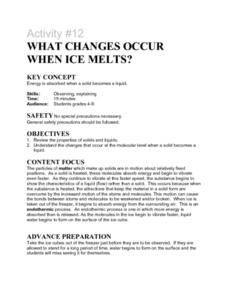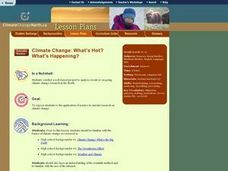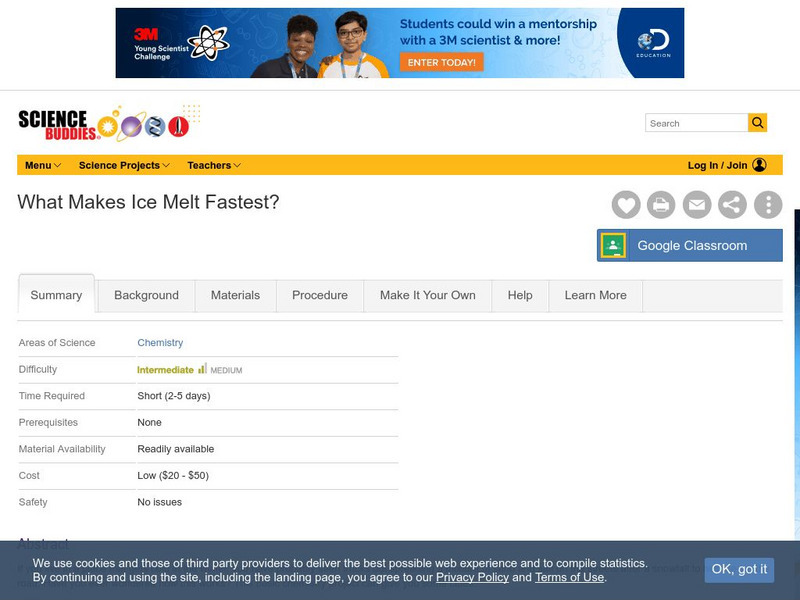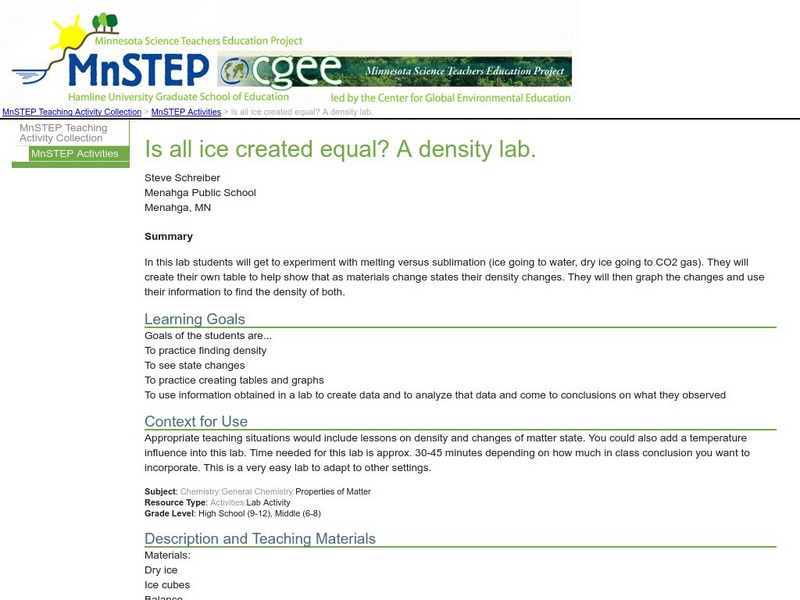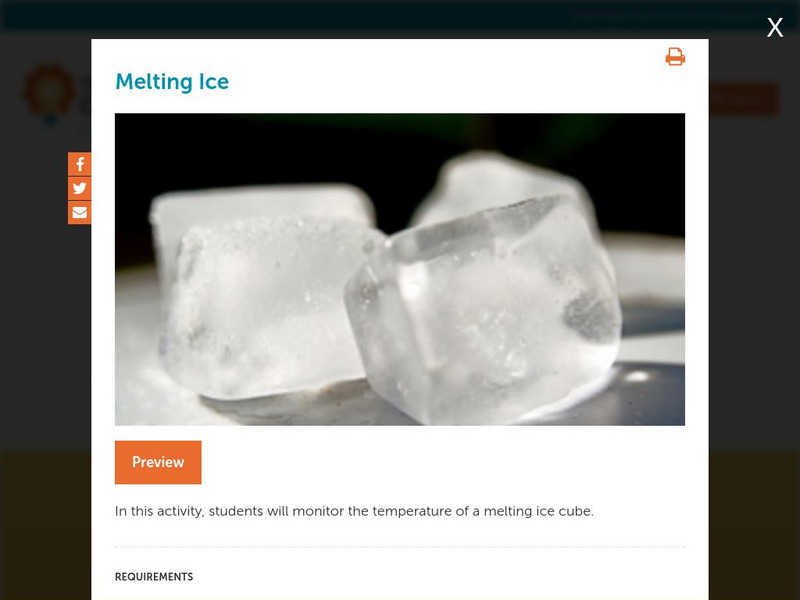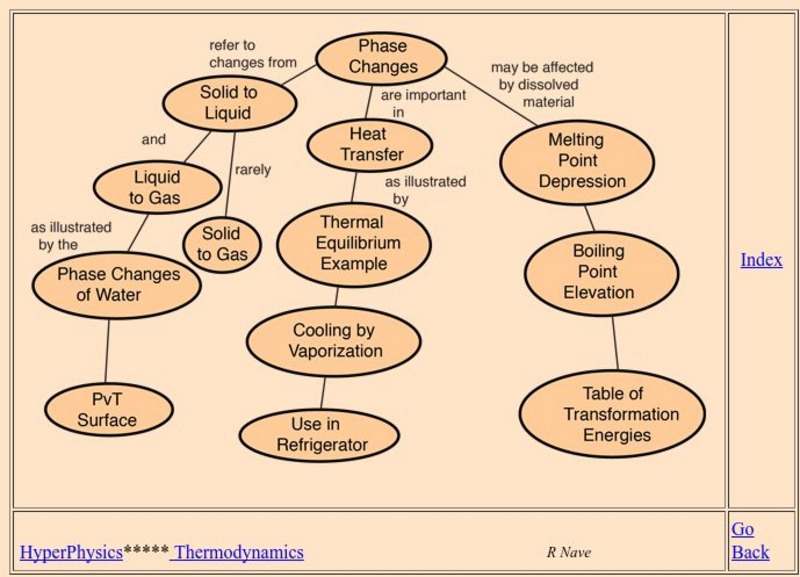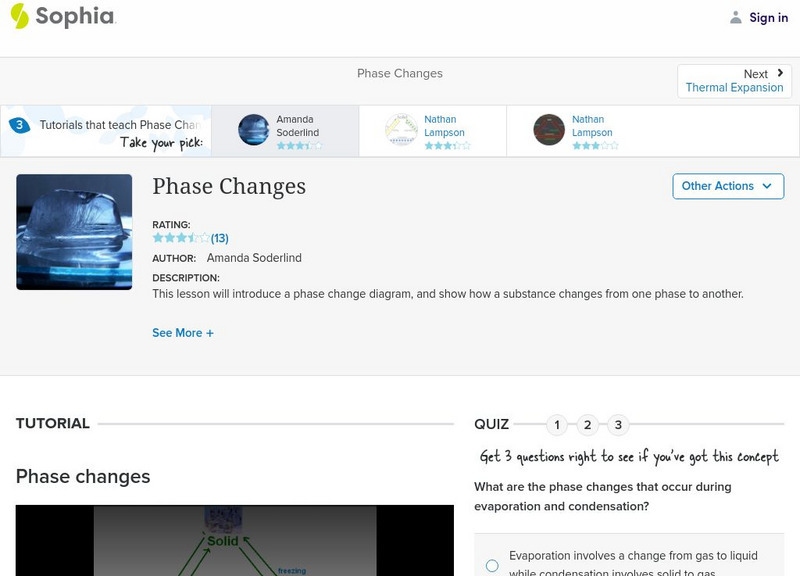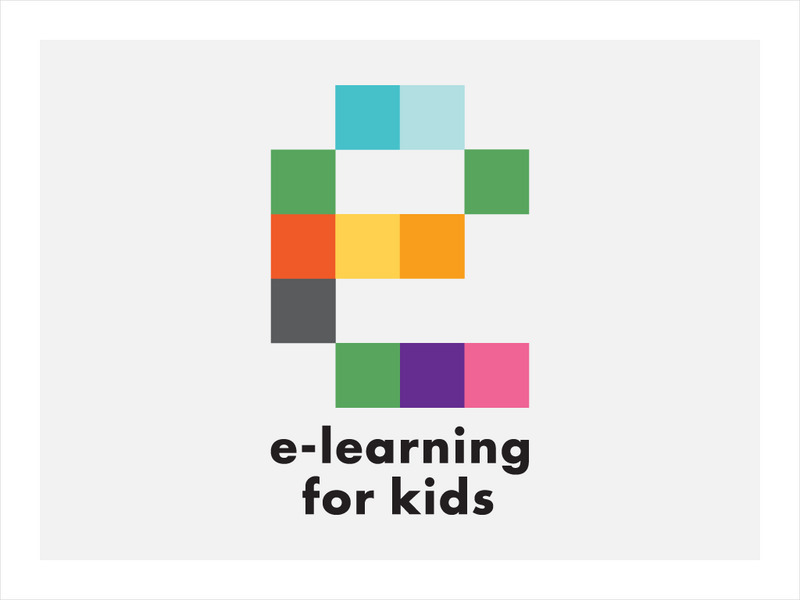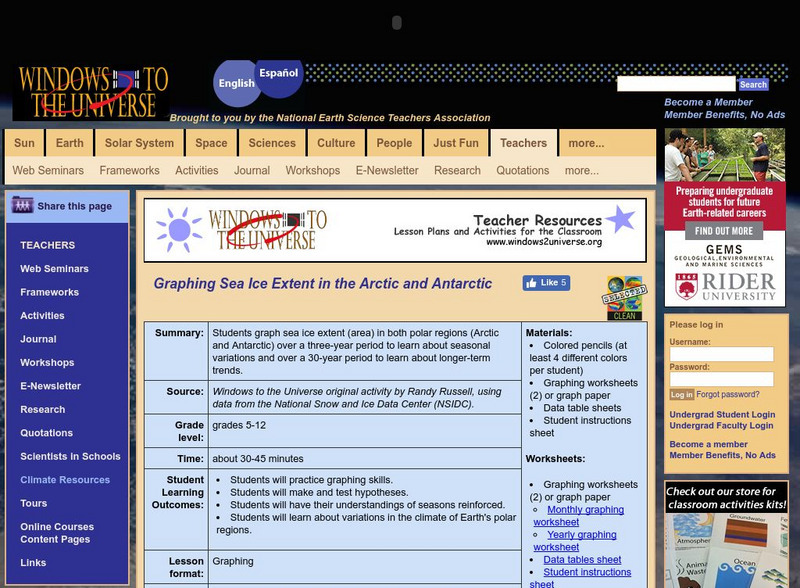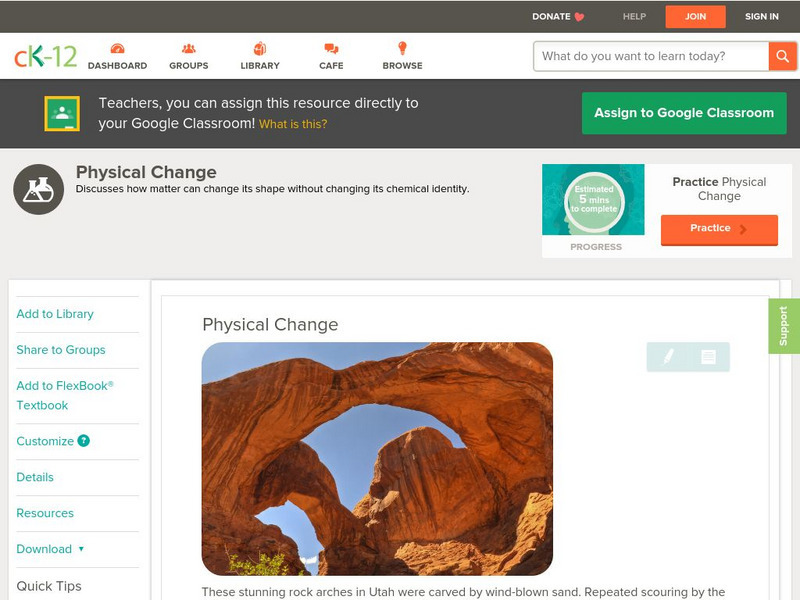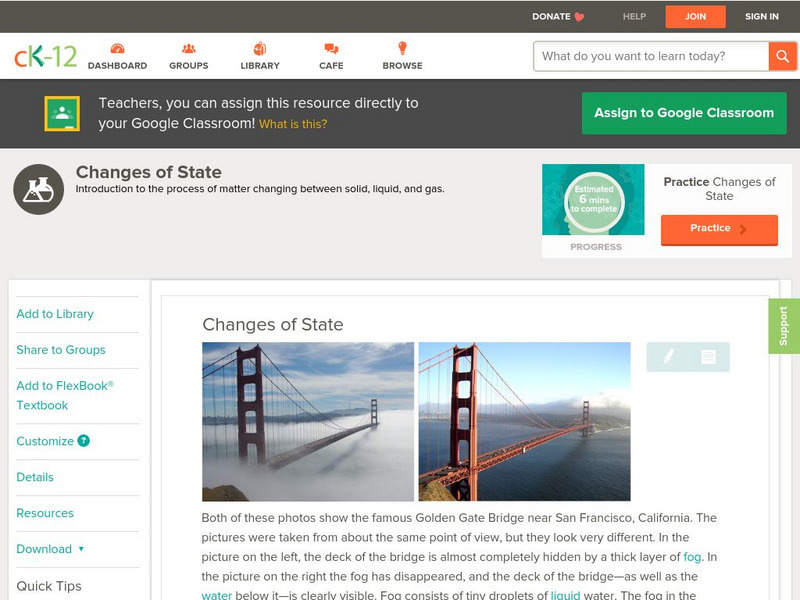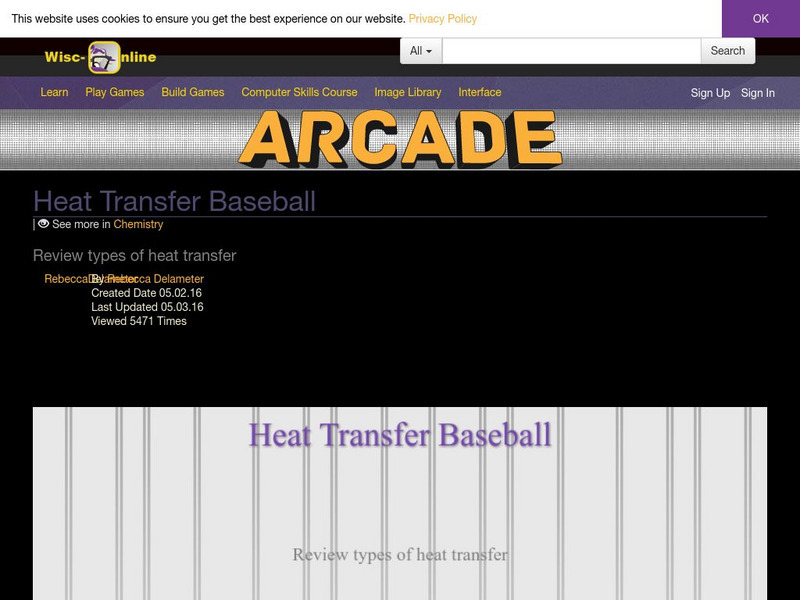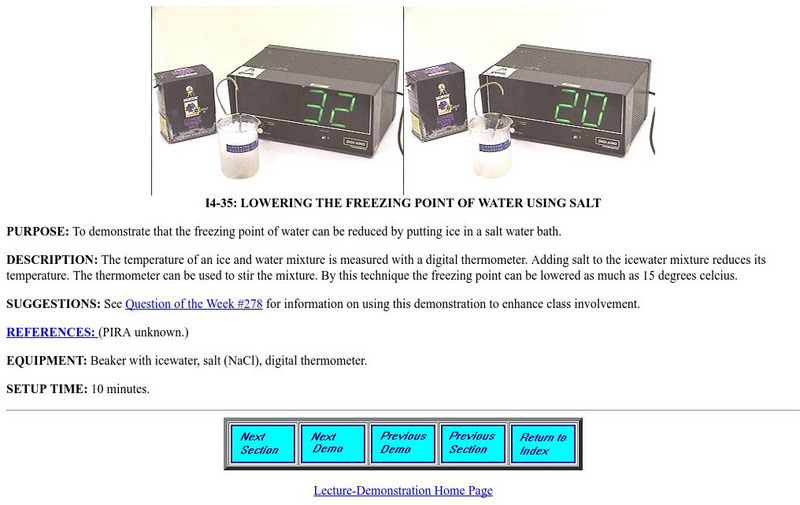Curated OER
What Changes Occur When Ice Melts?
Students explore the physical process of melting. They observe melting ice and answer questions related to energy transfer during phase changes.
Curated OER
Climate Change: What's Hot? What's Happening?
Students conduct a web-based project to analyze recent or on-going climate change research in the North. They are exposed to the application of science in current research on climate change.
Curated OER
When Land Ice Melts
Students investigate what happens when land ice melts. They discuss how the melting of land ice is different than the melting of icebergs. Students observe what happens as the ice melts.
American Chemical Society
Middle School Chemistry: Changing State: Melting
Discover the concept that energy transfer and molecular motion cause the change in state from a solid to a liquid. Also compare state changes of water to the state changes of other substances.
Science Buddies
Science Buddies: What Makes Ice Melt Fastest?
If you live in a place that gets cold in the winter, you have most likely seen trucks spreading a mixture of sand and salt on the streets after a snowfall to help de-ice roads. This basic chemistry project gives you clues to discover how...
Science Education Resource Center at Carleton College
Serc: Is All Ice Created Equal? A Density Lab
A lab experiment that shows students that different molecules melt in different ways. This lab also allows students to practice calculating and finding density, mass, and volume. Lesson plan includes lab handout for students.
American Chemical Society
Middle School Chemistry: Chapter 2: Changes of State
Five chemistry lessons about phase changes between the states of mattter complete with handouts and animations.
BBC
Bbc Schools: Ks2 Bitesize: Science: Materials: Changes in Materials
Help solve the mystery and find the missing crystal. Following the activity, read more about chemical and physical changes, and then take a quick quiz to check for understanding.
Concord Consortium
Concord Consortium: Stem Resources: Melting Ice
Using temperature probes, students will monitor the temperature of melting ice cubes in different situations. This lab activity, allows students to view the procedure and answer questions online that can be saved and evaluated by the...
Georgia State University
Georgia State University: Hyper Physics: Phase Change Concepts
An indexing page for the HyperPhysics site. This page includes links to a variety of pages at the site which contain information related to phase changes. Each individual page consists of informative graphics and clear explanations.
Climate Literacy
Clean: Sea Level Rise
Students will learn the difference between sea ice and glaciers in relation to sea level rise using topographic maps.
Other
Chem Cases: Nutra Sweet: Physical and Chemical Properties
An in-depth look at the physical and chemical properties of aspartame, or NutraSweet.
Sophia Learning
Sophia: Phase Changes: Lesson 1
This lesson will introduce a phase change diagram, and show how a substance changes from one phase to another. It is 1 of 3 in the series titled "Phase Changes."
E-learning for Kids
E Learning for Kids: Science: Loch Ness: What Happens When Solids and Liquids Are Heated or Cooled?
Students will look at what happens to different types of matter when they have a change of state.
Other
Howto smile.org: From Gas to Liquid to Solid
Allow your students to explore states of matter as they learn what causes frost to form on the outside of a cold container. Students will observe how liquid water can change to ice or water vapor in this lab. Lesson includes background...
TeachEngineering
Teach Engineering: Do Different Colors Absorb Heat Better?
Students test whether the color of a material affects how much heat it absorbs. Students will place an ice cube in a box made of colored paper (one box per color; white, yellow, red and black), which they will place in the sun. The...
National Earth Science Teachers Association
Windows to the Universe: Graphing the Extent of Sea Ice in Arctic and Antarctic
Students graph sea ice extent in both polar regions over a three-year period to learn about seasonal variations, and over a 30-year period to learn about longer-term trends.
CK-12 Foundation
Ck 12: Chemistry: Physical Change
[Free Registration/Login may be required to access all resource tools.] Definition of physical change and examples, and how physical changes can be reversed.
Georgia State University
Georgia State University: Hyper Physics: Heat of Fusion
The heat of fusion is defined and described. A graphical representation of the heat of vaporization is given. A method for measuring and calculating the heat of fusion is also presented and explained.
CK-12 Foundation
Ck 12: Physical Science: Melting
[Free Registration/Login may be required to access all resource tools.] What happens to matter when it melts and the definition of melting point.
CK-12 Foundation
Ck 12: Physical Science: Changes of State
[Free Registration/Login may be required to access all resource tools.] Definition of a change of state and the physical processes that cause it.
Wisc-Online
Wisc Online: Chemistry: Heat Transfer
Answer the thermal energy transfer questions correctly, and advance around the baseball diamond.
University of Maryland
University of Maryland: Regelation: Ice Under Pressure
A page from the University of Maryland Physics Lecture Demonstration Facility. Provides directions for a teacher demonstration on the phenomenon of regelation. Shows apparatus and set-up; provides suggestions. Easily adaptable as a...
University of Maryland
Lowering the Freezing Point of Water Using Salt
A page from the University of Maryland Physics Lecture Demonstration Facility. Provides directions for a teacher demonstration of the effect of an ionic solute upon the freezing point of water. Shows apparatus and set-up; provides...


